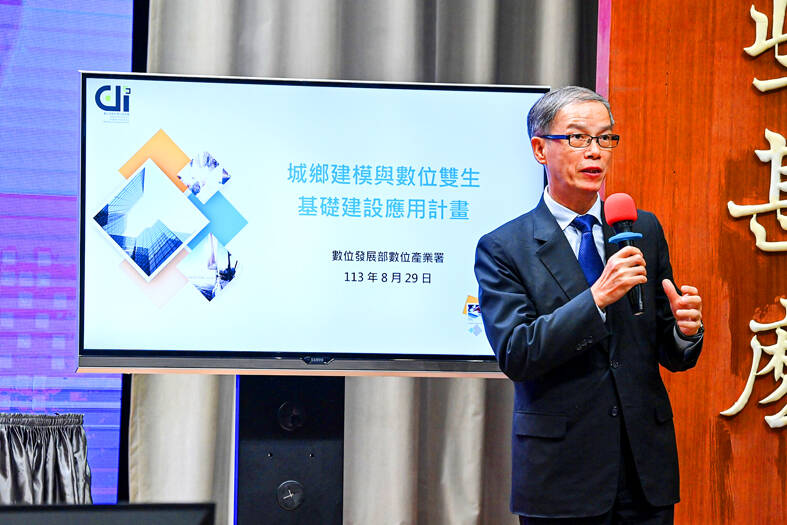The government is to allocate NT$1.8 billion (US$56.4 million) over the next four years to build basic digital infrastructure for “digital twins” technology applications, the Cabinet said on Thursday.
The program aims to attract overall investment of NT$2 billion to boost the tourism, culture, entertainment and gaming sectors, and close the “digital gap” between rural and urban centers by encouraging local governments to collaborate with the private sector, Ministry of Digital Affairs officials told a news conference.
The Cabinet on May 31 announced a roadmap for the Asia Silicon Valley Development Plan 3.0 in response to growth of generative artificial intelligence (AI), 5G and satellite telecommunication, and to help Taiwanese industry meet the twin challenges of transitioning to digital and net zero business models, ministry officials said.

Photo courtesy of the Executive Yuan
The program for “digital twin” applications is among the efforts to build up the needed basic infrastructure at the local level, they said.
Implementing the digital twins program would boost innovation and growth for Taiwan’s entertainment, e-commerce, e-learning, sports technology, tourism, culture and entertainment sectors, and elevate the competitiveness of local digital business sectors, the ministry said.
“In the past, most public project budgets were spent on building and hardware projects. For the digital twins program, we have taken examples from other countries,” officials said.
They cited Japan’s Virtual Shibuya, the Assassin’s Creed Unity video game developed by French-Canadian game developer Ubisoft Montreal, and South Korea’s “Virtual Seoul” platform.
Under the new program, for the first time the government would have public project budgets for developing software, 3D modeling, online networks and related digital technologies, and to build up the nation’s digital content library, officials said.
Administration for Digital Industries Deputy Director-General Lin Chun-hsiu (林俊秀) said in other countries 3D modeling and software development are joint ventures between the public and private sectors.
After a while these become available for commercial use and innovative applications for concerts, large-scale e-gaming competitions, e-commerce platforms, sports technology, online learning, tourism, culture and entertainment, he said.
“In the future, these can be applied for immersive cultural and historic heritage exhibitions, 5G mobile connection, 3D modeling, augmented reality and generative AI. It would facilitate more interactive experiences,” he said.
“The applications can be used to create landscape and props for gaming and virtual concerts. They would reduce expenses and allow government agencies to implement new projects more quickly,” Lin said.
He said the new digital twins program would bring about NT$4.5 billion of economic benefits via 14 infrastructure projects across the nation.
Twenty-six specially designated digital 3D model sites would be used, and 56 firms are estimated to invest, he said, adding that more than 40 new digital applications are expected to be produced.

A preclearance service to facilitate entry for people traveling to select airports in Japan would be available from Thursday next week to Feb. 25 at Taiwan Taoyuan International Airport, Taoyuan International Airport Corp (TIAC) said on Tuesday. The service was first made available to Taiwanese travelers throughout the winter vacation of 2024 and during the Lunar New Year holiday. In addition to flights to the Japanese cities of Hakodate, Asahikawa, Akita, Sendai, Niigata, Okayama, Takamatsu, Kumamoto and Kagoshima, the service would be available to travelers to Kobe and Oita. The service can be accessed by passengers of 15 flight routes operated by

Chinese spouse and influencer Guan Guan’s (關關) residency permit has been revoked for repeatedly posting pro-China videos that threaten national security, the National Immigration Agency confirmed today. Guan Guan has said many controversial statements in her videos posted to Douyin (抖音), including “the red flag will soon be painted all over Taiwan” and “Taiwan is an inseparable part of China,” and expressing hope for expedited reunification. The agency last year received multiple reports alleging that Guan Guan had advocated for armed reunification. After verifying the reports, the agency last month issued a notice requiring her to appear and explain her actions. Guan

GIVE AND TAKE: Blood demand continues to rise each year, while fewer young donors are available due to the nation’s falling birthrate, a doctor said Blood donors can redeem points earned from donations to obtain limited edition Formosan black bear travel mugs, the Kaohsiung Blood Center said yesterday, as it announced a goal of stocking 20,000 units of blood prior to the Lunar New Year. The last month of the lunar year is National Blood Donation Month, when local centers seek to stockpile blood for use during the Lunar New Year holiday. The blood demand in southern Taiwan — including Tainan and Kaohsiung, as well as Chiayi, Pingtung, Penghu and Taitung counties — is about 2,000 units per day, the center said. The donation campaign aims to boost

The Central Weather Administration (CWA) said a magnitude 4.9 earthquake that struck off the coast of eastern Taiwan yesterday was an independent event and part of a stress-adjustment process. The earthquake occurred at 4:47pm, with its epicenter at sea about 45.4km south of Yilan County Hall at a depth of 5.9km, the CWA said. The quake's intensity, which gauges the actual effects of a temblor, was highest in several townships in Yilan and neighboring Hualien County, where it measured 4 on Taiwan's seven-tier intensity scale, the CWA said. Lin Po-yu (林柏佑), a division chief at the CWA's Seismological Center, told a news conference